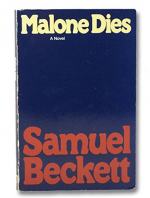|
This section contains 1,906 words (approx. 5 pages at 400 words per page) |

|
Impotence and the Body
A significant theme in Malone Dies, and throughout Beckett’s trilogy, is bodily impotence, understood here as the failure of the body to perform its functions. For Beckett, impotence functions thematically to complicate the boundary between life and death, for if the body lacks the means to function and have an effect upon the world, then it is not far from a state of inexistence: it is a veritable death-in-life. Throughout the novel, it is clear that Malone’s physical condition is one of deterioration – when Malone decides to tell the readers a bit about himself, the first thing he notes is his failing body: “My body is what is called, unadvisedly perhaps, impotent. There is virtually nothing it can do” (180). To this point, Malone’s old age and ailing body have made him unable to eat anything but soup, unable to see...
|
This section contains 1,906 words (approx. 5 pages at 400 words per page) |

|




